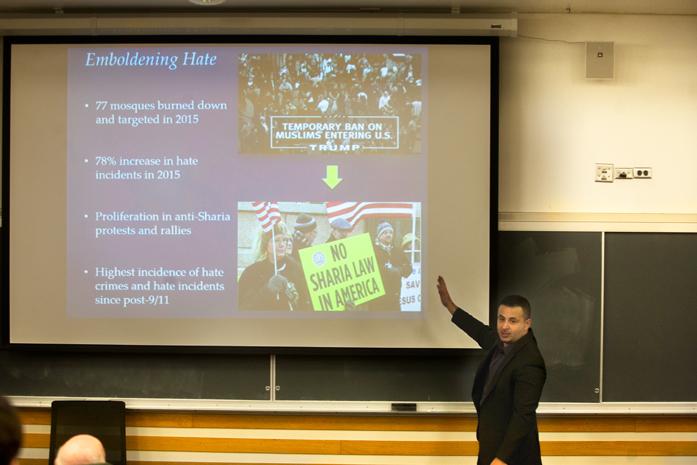A law professor examines ‘Islamophobia’ from his perspective.
By Jason Estrada
jason-estrada@uiowa.edu
“Islamophobia” is a term often used, but one scholar sought to find a concrete definition for the word.
Khaled Beydoun, an associate professor of law at the University of Detroit Mercy School of Law, discussed his research on the term on Monday at the University of Iowa College of Law.
When Beydoun was thinking about Islamophobia, he said, he mostly focused his research on the term by examining such items as legal literature, popular-media space, and social-media space. In his research and findings, he realized there was never a consistent definition for the term.
Scholars, activists, and media personalities were defining and framing the term in distinct ways, he said, so Beydoun sought to find an organized definition for Islamophobia for legal purposes and law scholars.
“The presumption that Islam is inherently violent [and] alien … [is] driven by the beliefs that expression of Muslim identity are portative with the propensity of terrorism,” he said.
His research and definition of the term also inspired him to write an article called “Islamophobia: Toward a Legal Definition and Framework,” which was published online in the Columbia Law Review and inspired Monday’s presentation.
Beydoun said there are three dimensions of Islamophobia, most notably dialectical, meaning state laws and policies shape and confirm people’s views and stereotypes of Islam.
He noted 9/11 was the major shift for Islam, and the event forced Americans who had no exposure to the religion to think deeply about it.
Salma Haider, the vice president of the UI Muslim Student Association, said she believes Islamophobia existed before 9/11. She defined Islamophobia as people who have a hatred and fear toward Muslims because of ignorance and lack of education.
“Personally, I believe that Islamophobia existed before 9/11, but after 9/11, it became more noticeable and increased in frequency,” she said. “It has gotten worse after 9/11 because people believe they know what Islam and Muslims believe, but all their information comes from biased news coverage.”
Beydoun said it is imperative to not think of Islamophobia as an American phenomenon but a global phenomenon.
“For France, Islamophobia is alive and well, and we see it being manifested by both popular rhetoric, political strategy on the part of Le Pen, the National Front, the national party, but also by way of law,” he said.
Beydoun noted Islamophobia exists in the Trump administration, especially since President Trump’s recent travel ban, which tried to block travel from seven predominantly Muslim countries. That ban has been halted by an appellate court.
“After Trump, it has gotten even worse because he triggers hate with his rhetoric. For example, by banning Muslims, he is basically saying we’re all bad,” Haider said.
Adrien Wing, the director of the UI Center for Humans Rights, agreed Islamophobia is a critical issue here in the United States.
“I’ve been focusing on the Muslim world for over 30 years, so I think that Beydoun’s presentation did a really great job of summarizing the different ways of looking at Islamophobia and helping people who have never looked at the topic before and helping people come to grip what it might mean,” she said.



